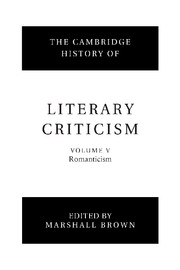Book contents
- Frontmatter
- Introduction
- 1 Classical standards in the period
- 2 Innovation and modernity
- 3 The French Revolution
- 4 Transcendental philosophy and Romantic criticism
- 5 Nature
- 6 Scientific models
- 7 Religion and literature
- 8 Language theory and the art of understanding
- 9 The transformation of rhetoric
- 10 Romantic irony
- 11 Theories of genre
- 12 Theory of the novel
- 13 The impact of Shakespeare
- 14 The vocation of criticism and the crisis of the republic of letters
- 15 Women, gender and literary criticism
- 16 Literary history and historicism
- 17 Literature and the other arts
- Bibliography
- Index
- References
14 - The vocation of criticism and the crisis of the republic of letters
Published online by Cambridge University Press: 28 March 2008
- Frontmatter
- Introduction
- 1 Classical standards in the period
- 2 Innovation and modernity
- 3 The French Revolution
- 4 Transcendental philosophy and Romantic criticism
- 5 Nature
- 6 Scientific models
- 7 Religion and literature
- 8 Language theory and the art of understanding
- 9 The transformation of rhetoric
- 10 Romantic irony
- 11 Theories of genre
- 12 Theory of the novel
- 13 The impact of Shakespeare
- 14 The vocation of criticism and the crisis of the republic of letters
- 15 Women, gender and literary criticism
- 16 Literary history and historicism
- 17 Literature and the other arts
- Bibliography
- Index
- References
Summary
To whom did the critic speak, and who could occupy the office of ‘critic’? This chapter explores the roles of men and women of ‘letters’ in the Romantic age as a framework for understanding the vocation of Romantic criticism. Until the beginning of the nineteenth century, critics and reviewers of poetry, drama or the novel worked within the wider context of two closely related early modern categories: ‘polite literature’ and the ‘republic of letters’. The crisis of both categories, between 1780 and 1830, produced changes in culture and criticism that would profoundly alter the status of literature itself in the nineteenth and twentieth centuries. ‘Polite letters’ embraced the genres of historiography, natural philosophy, moral philosophy and political discourse as well as poetry, drama and criticism itself, while significantly excluding the new genre of the novel. Resting on this basis, the early modern idea of a ‘republic of letters’ defined a territory that existed on no European map – an ‘elusive, often deliberately mysterious domain’, as Elizabeth Eisenstein remarks – yet shaped the self-understanding of European criticism until the last decade of the eighteenth century.
At that point, the historian's road map to the republic of letters becomes more obscure. By 1800 its authority over the organization of reading and writing seems to have diminished as quickly as Edmund Burke's ‘political Men of Letters’ were discredited in the French Revolution controversy of the 1790s. Instead of an idealized unity of critical reasoners embedded in modern print culture, the republic of letters became in the Romantic age a confusing clash of those ‘sects and systems’ that, according to David Hume, the early modern republic had triumphantly suppressed.
- Type
- Chapter
- Information
- The Cambridge History of Literary Criticism , pp. 296 - 320Publisher: Cambridge University PressPrint publication year: 2000
References
- 1
- Cited by

